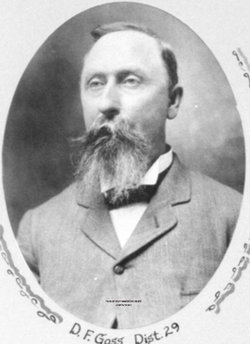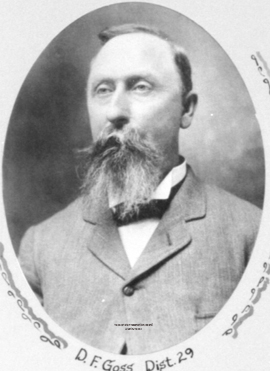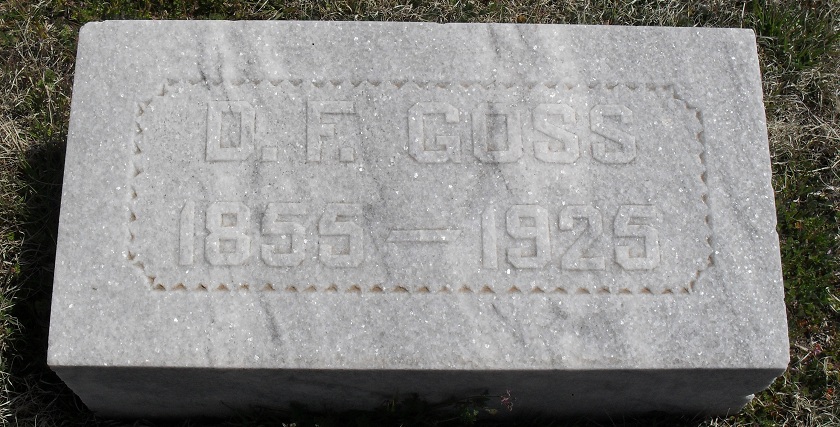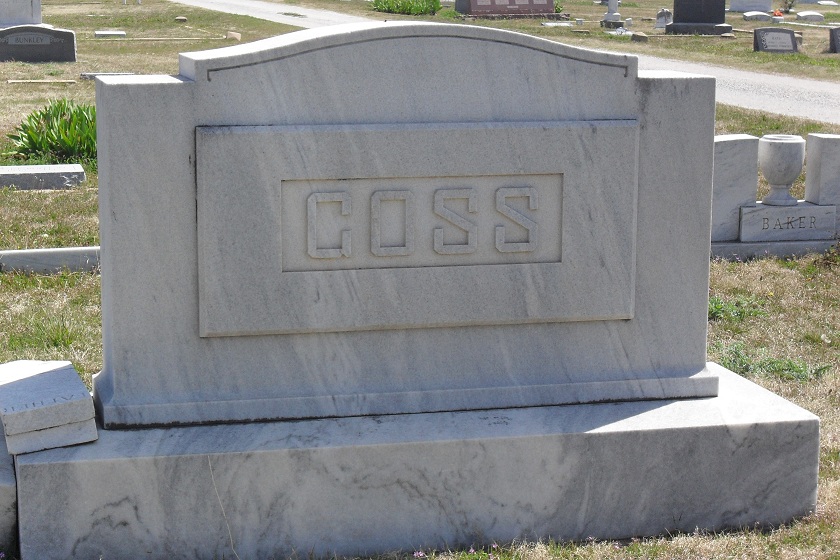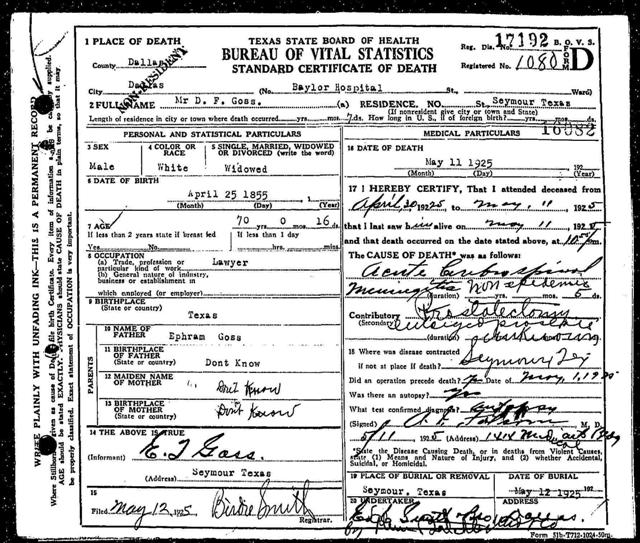Judge Goss was an ardent prohibitionist, even in a time when that hurt his law practice badly. A college graduate of Add Ran College in 1878, Judge Goss saw to it that his children received college education. Judge Goss was a membger of the First Christian Church at Seymour. He raised a large family in that faith and was a loving father and husband.
contributor: Searchers of our Past
******************
Name: D. F. Goss
Death date: 11 May 1925
Death place: Dallas, Dallas Co., Texas
Gender: Male
Race or color (on document): white
Age at death: 70 years 16 days
Birthdate: 25 Apr 1855
Birthplace: Texas
Marital status: Widowed
Father's name: Ephram Goss
Occupation: Lawyer
Residence: Seymour, Texas
Burial place: Seymour, Texas
Burial date: 12 May 1925
Film number: 2113846
Digital GS number: 4165569
Image number: 2374
Reference number: rN 17192
Collection: Texas Deaths, 1890-1976
*********
GOSS, D. F.
D. F. Goss, Seymour, Montague County. Born in Rockwall county, Texas, April 25, 1855; lawyer.
Mr. Goss was reared on a farm in Rockwall county and received a liberal education, being a graduate of Add-Ran college. He taught school several years, but began the practice of law at Rockwall in 1883. He moved to Seymour, Baylor county, Texas, in the year 1885, where he has since resided. He was elected on the democratic ticket to the state senate in 1892 and re-elected in 1896; he represents the Twenty-ninth senatorial district; embracing 49 counties, and including all the Panhandle of Texas; he has served on some of the most important committees in the senate, such as judiciary No 1 and No 2, and the committee on education, and was chairman of the committee on public lands in the Twenty-fourth and Twenty-fifth legislatures; he is a warm advocate of the enlarged efficiency of our public free schools, and has heartily supported measures intended for their improvement. As chairman of the joint committee of the two houses in the Twenty-fifth legislature on the question of the adoption of a uniform system of text books for the public schools, he rendered valuable service in favor of State uniformity, and in the debates on the floor of the senate aided much in the passage of the Presler bill. While warmly advocating state uniformity under present conditions, he believes that the right solutions of the question is free text books furnished by local or district taxation. He is the author of the constitutional amendment making the railroad commission elective. Representing a district in which there is a great deal of state school land, his attention has been directed mainly to land legislation, and he is the author of the act passed by the Twenty-fourth legislature validating locations of land made by virtue of sidings certificates, where the lands are owned by purchasers in good faith for value.
He is also the author of the general act of 1895 for the sale and lease of the public free school and asylum lands, and the amendments to that act passed in 1897. This is regarded as the most important legislation affecting West Texas interests that has been had for many years, and it has helped to give additional impetus to stock raising and stock farming in that section of the state. (The Houston Post, Houston, Tex, Apr 17, 1899 )
Judge Goss was an ardent prohibitionist, even in a time when that hurt his law practice badly. A college graduate of Add Ran College in 1878, Judge Goss saw to it that his children received college education. Judge Goss was a membger of the First Christian Church at Seymour. He raised a large family in that faith and was a loving father and husband.
contributor: Searchers of our Past
******************
Name: D. F. Goss
Death date: 11 May 1925
Death place: Dallas, Dallas Co., Texas
Gender: Male
Race or color (on document): white
Age at death: 70 years 16 days
Birthdate: 25 Apr 1855
Birthplace: Texas
Marital status: Widowed
Father's name: Ephram Goss
Occupation: Lawyer
Residence: Seymour, Texas
Burial place: Seymour, Texas
Burial date: 12 May 1925
Film number: 2113846
Digital GS number: 4165569
Image number: 2374
Reference number: rN 17192
Collection: Texas Deaths, 1890-1976
*********
GOSS, D. F.
D. F. Goss, Seymour, Montague County. Born in Rockwall county, Texas, April 25, 1855; lawyer.
Mr. Goss was reared on a farm in Rockwall county and received a liberal education, being a graduate of Add-Ran college. He taught school several years, but began the practice of law at Rockwall in 1883. He moved to Seymour, Baylor county, Texas, in the year 1885, where he has since resided. He was elected on the democratic ticket to the state senate in 1892 and re-elected in 1896; he represents the Twenty-ninth senatorial district; embracing 49 counties, and including all the Panhandle of Texas; he has served on some of the most important committees in the senate, such as judiciary No 1 and No 2, and the committee on education, and was chairman of the committee on public lands in the Twenty-fourth and Twenty-fifth legislatures; he is a warm advocate of the enlarged efficiency of our public free schools, and has heartily supported measures intended for their improvement. As chairman of the joint committee of the two houses in the Twenty-fifth legislature on the question of the adoption of a uniform system of text books for the public schools, he rendered valuable service in favor of State uniformity, and in the debates on the floor of the senate aided much in the passage of the Presler bill. While warmly advocating state uniformity under present conditions, he believes that the right solutions of the question is free text books furnished by local or district taxation. He is the author of the constitutional amendment making the railroad commission elective. Representing a district in which there is a great deal of state school land, his attention has been directed mainly to land legislation, and he is the author of the act passed by the Twenty-fourth legislature validating locations of land made by virtue of sidings certificates, where the lands are owned by purchasers in good faith for value.
He is also the author of the general act of 1895 for the sale and lease of the public free school and asylum lands, and the amendments to that act passed in 1897. This is regarded as the most important legislation affecting West Texas interests that has been had for many years, and it has helped to give additional impetus to stock raising and stock farming in that section of the state. (The Houston Post, Houston, Tex, Apr 17, 1899 )
Family Members
Sponsored by Ancestry
Advertisement
Records on Ancestry
Advertisement
